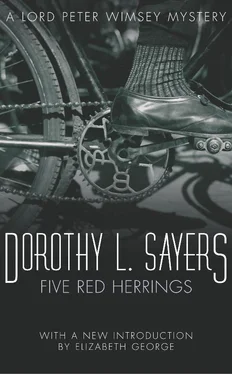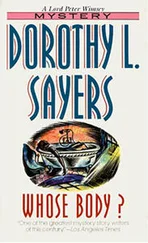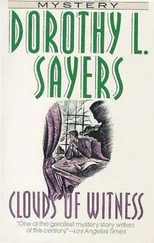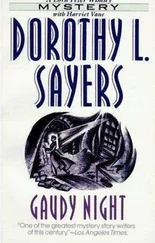The railway-station at Gatehouse is approached by one of those gates so numerous in the Border Country, which provide some slight restraint upon straying cattle but to the impatient motorist appear an unmitigated nuisance. As usual, however, at this point, an obliging old gentleman emerged from the little group of cottages by the wayside and let Wimsey through.
Immediately beyond the gate, the road branches right and left into a rough, stony track, of which the left-hand side goes deviously down to Creetown, while the right-hand side wanders away to Dromore and ends abruptly at the railway viaduct. Wimsey crossed this road and kept straight on down a steep little approach, heavily masked by rhododendrons, which brought him to the station.
The line from Castle-Douglas to Stranraer is a single one, but boasts of two sets of rails at Gatehouse Station, for the better convenience of passengers and to allow of the passing of trains. Wimsey approached the station-master, who was profiting by a slack period between two trains to study the Glasgow Bulletin in his office.
‘I’ve been trying to find Mr. Ferguson,’ said Wimsey, after the usual greetings, ‘to fix up a fishing-party at Loch Skerrow, but I’m told he went away this morning by the 9.8. Is that so?’
‘Ay, that is so. I saw him mysel’.’
‘I wonder when he’ll be back. Was he going to Glasgow, do you know, or only to Dumfries?’
‘He mentioned he was gaun to Glasgow,’ said the station-master, ‘but he’ll maybe be back the nicht. Angus here will be able to tell ye if he took a return ticket.’
The booking-clerk, who shared the station-master’s office, remembered Mr. Ferguson very well, because he had taken a first-class return to Glasgow, an extravagance somewhat unusual among the artist community.
‘But of course,’ said Wimsey, ‘the ticket is available for three months. He’s not bound to return today. Did he leave his car here, I wonder?’
‘He didna come by car,’ said the clerk. ‘He tell’t me the magneto was broken down, and he was obliged to take the train from here, instead o’ drivin’ to Dumfries.’
‘Oh, then he bicycled up, I suppose,’ said Wimsey, carelessly.
‘Nay,’ said the station-master, ‘he’ll have come with Campbell’s ’bus. He arrived aboot that time, did he no, Angus?’
‘He did that. He was talkin’ with Rabbie McHardy when he came in. He’ll maybe have told him how long he thocht to be stayin’ in Glasgow.’
‘Thanks,’ said Wimsey. ‘I’ll have a word with Rabbie. I wanted to charter a boat for tomorrow, but if Ferguson isn’t going to be back, it’s not much use, is it?’
He chatted for a few minutes more, giving them a suitably censored account of the Campbell affair, and then took his leave. He had not got very much farther, except that he seemed to have more or less eliminated Ferguson from his list of suspects. He would have to check him up, of course, and see that he really had arrived in Glasgow. This might present a little difficulty, but it was merely routine work for Dalziel and his myrmidons.
Wimsey looked at his watch. Jock Graham was at present the most promising candidate for criminal honours, but since he had disappeared, there was nothing to be done about him for the present. There was, however, still time to go and interview Strachan, and so round off his inquiries in Gatehouse.
STRACHAN
Strachan lived in a pleasant, middle-sized house handily situated for him a little way out of Gatehouse on the road that goes up to the golf-course. The neat maid who came to the door smiled kindly upon the visitor and said that the master was at home and would his lordship please step in.
His lordship stepped accordingly into the sitting-room where he found Mrs. Strachan seated by the window instructing her small daughter Myra in the art of plain knitting.
Wimsey apologised for calling just before dinner, and explained that he wanted to fix up with Strachan about a foursome.
‘Well, I don’t quite know,’ said Mrs. Strachan, a trifle doubtfully. ‘I don’t think Harry is likely to be playing for a day or two. He’s had rather a tiresome — oh, well! I really don’t know. Myra, dear, run and tell Daddy Lord Peter Wimsey is here and wants to talk to him. You know, I never like to make any sort of arrangements for Harry — I always manage to put my foot in it.’
She giggled — she was rather a giggly woman at the best of times. Nervousness, Wimsey supposed. Strachan had an abrupt manner which tended to make people nervous, and Wimsey more than suspected him of being a bit of a domestic tyrant.
He said something vague about not wanting to be a nuisance.
‘Of course not,’ said Mrs. Strachan, keeping an uneasy eye on the door, ‘how could you be a nuisance? We’re always so delighted to see you. And what have you been doing with yourself this beautiful day?’
‘I’ve been up to the Minnoch to see the body,’ said Wimsey, cheerfully.
‘The body?’ cried Mrs. Strachan, with a little squeal. ‘How dreadful that sounds! What do you mean? A salmon, or something?’
‘No, no,’ said Wimsey. ‘Campbell — Sandy Campbell — haven’t you heard?’
‘No, what?’ Mrs. Strachan opened her large baby blue eyes very wide indeed. ‘Has anything happened to Mr. Campbell?’
‘Good Lord,’ said Wimsey, ‘I thought everybody knew. He’s dead. He tumbled into the Minnoch and got killed.’
Mrs. Strachan gave a shrill shriek of horror.
‘Killed? How perfectly dreadful! Was he drowned?’
‘I don’t quite know,’ said Wimsey. ‘I think he bashed his head in, but he may have been drowned as well.’
Mrs. Strachan shrieked again.
‘When did it happen?’
‘Well,’ said Wimsey, cautiously, ‘they found him about lunchtime.’
‘Good gracious! And we never knew anything about it. Oh, Harry’ — as the door opened — ‘what do you think? Lord Peter says poor Mr. Campbell has been killed up at the Minnoch!’
‘Killed?’ said Strachan. ‘What do you mean, Milly? Who killed him?’
Mrs. Strachan shrieked a third time, more loudly.
‘Of course I don’t mean that, Harry. How absurd and how horrible! He fell down and cut his head open and got drowned.’
Strachan came forward rather slowly and greeted Wimsey with a nod.
‘What’s all this about, Wimsey?’
‘It’s perfectly true,’ said Wimsey. ‘They found Campbell’s dead body in the Minnoch at 2 o’clock. Apparently he had been painting and slipped over the edge of the granite and cracked his skull on the stones.’
He spoke a little absently. It was surely not his fancy that his host looked exceedingly pale and upset, and now, as Strachan turned his face round into the full light of the window, it was obvious that he was suffering from a black eye — a handsome and well-developed black eye, rich in colour and full in contour.
‘Oh!’ said Strachan. ‘Well, I’m not surprised, you know. That’s a very dangerous spot. I told him so on Sunday, and he called me a fool for my pains.’
‘Why, was he up there on Sunday?’ said Wimsey.
‘Yes, making a sketch or something. You remember, Milly, just on the other side of the burn from where we were picnicking.’
‘Goodness!’ exclaimed Mrs. Strachan, ‘was that the place? Oo! how perfectly horrid! I’ll never go there again, never. You may say what you like. Wild horses wouldn’t drag me.’
‘Don’t be ridiculous, Milly. Of course you needn’t go there if you don’t want to.’
‘I should always be afraid of Myra falling in and being killed,’ said Mrs. Strachan.
‘Very well, then,’ said her husband, impatiently. ‘Don’t go there. That settles that. How did all this happen, Wimsey?’
Читать дальше












